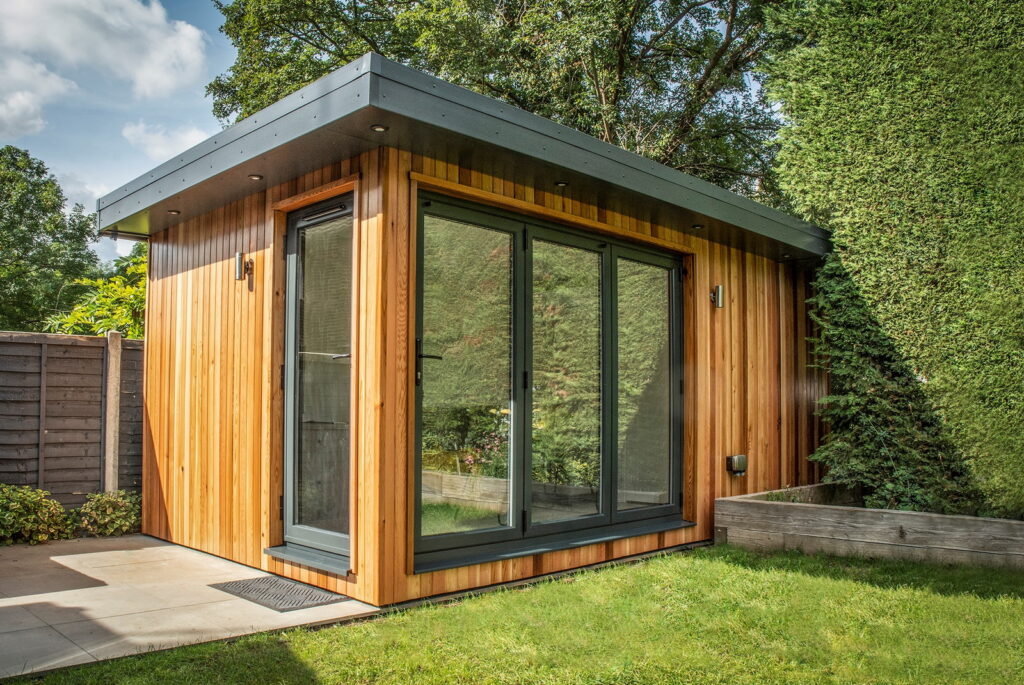In a world where our carbon footprint is under more scrutiny than our fashion choices, the home – our ultimate refuge and largest life investment – is shedding its old skin to reveal a new identity. The concept of garden rooms has bloomed into a greener lifestyle innovation that is not just a luxury but an extension of our environmental ethos.
Far more than a mere haven of comfort, it has evolved into the forge where our dreams of a more sustainable lifestyle are shaped and solidified.
This blog post discusses how incorporating a garden room into your property is more than an architectural or design decision – it’s a move towards a sustainable and enriching lifestyle.
Unearth the Eco friendly life at Your Back Door

Sustainability is not just a buzzword; it’s a lifestyle that’s here to stay. With garden rooms, homeowners have a unique canvas to practice and promote an eco friendly lifestyle without sacrificing the familiar comforts of home.
Here are several ways garden rooms can make a green lifestyle more attainable:
1. Harness the Power of Natural Light and Air
The strategic positioning of garden rooms allows for maximum natural light and ventilation. This passive design principle reduces the need for artificial lighting and air conditioning, slashing your energy consumption while providing a living space that feels connected to the environment.
- Solar Panels: Installing solar panels on the roof of your garden room can also help to drastically reduce energy costs.
- Skylights and Windows: The use of skylights and windows in garden rooms allows for even more natural light, reducing the need for artificial lighting during daylight hours.
2. Repurpose and Rejuvenate Your Space
Garden rooms offer an opportunity to declutter your main living space by moving non-essential items into a secondary, outdoor-inside room. This not only creates a more liveable space but also encourages a minimalist, more eco friendly lifestyle.
- Greenhouses: These innovative structures can be transformed into veritable greenhouses, supporting urban farming, vertical gardens, and providing a year-round sanctuary for flora that can improve local air quality and your diet.
- Upcycling: Repurposing old furniture and materials for use in your garden room is a great way to reduce waste and give new life to discarded items.
3. Connect with Nature

Garden rooms are like a gateway between the inside and outside world, creating a seamless transition that encourages you to spend more time outdoors. This connection with nature has numerous benefits, including reducing stress and promoting overall well-being.
- Outdoor Living: With the addition of outdoor furniture and amenities like a fire pit or BBQ, garden rooms can become an extension of your living space – perfect for entertaining guests or simply enjoying the outdoors with your family.
- Meditation Space: The peaceful atmosphere of a garden room makes it an ideal spot for meditation, yoga, or other mindful activities that can improve mental and physical health.
4. Sustainable Building Methods
The materials, construction process, and long-term use of garden rooms can all be aligned with sustainable practices and natural resources.
- From recycled and renewable resources to the use of passive solar design and renewable energy sources, garden rooms can set an aspirational standard for living spaces.
- Furthermore, the durability and low maintenance of garden rooms can ensure that they have a minimal impact on the environment over their lifespan.
5. Wildlife Friendly
Garden rooms, especially when coupled with conscientious garden design, create a haven for local wildlife and the natural environment.
- Strategically chosen plants and water features in the garden can support bees, butterflies, and a myriad of other beneficial species, contributing to the local ecosystem.
- This conscious effort towards coexistence with nature can further enhance the environmental impact of garden rooms.
6.Reduce Your Carbon Footprint
By incorporating sustainable practices in the design and use of garden rooms, homeowners can significantly reduce their carbon footprint.
- This entails lowering energy usage by applying passive design principles, utilizing renewable energy sources, and reducing waste to foster a more environmentally friendly lifestyle.
- Additionally, the potential for a home office or studio space in your garden room can reduce travel and commute time, minimizing your carbon footprint emissions.
The Psychological and Well-being Benefits

Sustainable eco friendly living extends beyond physical practices; it also influences our mental ecology. A greener lifestyle, facilitated by garden rooms, contributes to our well-being in profound ways:
Green Spaces for Mental Health
It’s a well-established fact that greenery has a positive impact on mental health. Garden rooms offer a personal green oasis, a refuge from urban life’s stress, and a place to reconnect with nature and workout even when weather or space doesn’t permit outdoor activities.
A Sense of Comfort and Security
By serving as a bridge between your indoor living space and the natural world, garden rooms create a sense of comfort and security, supporting mental well-being in a time when people are seeking stability in an uncertain future.
Fostering a Sense of Community
Garden rooms that serve as multipurpose spaces are excellent for hosting social gatherings and family activities. By encouraging more community-focused and shared space use, they promote a sense of belonging and mutual support that’s essential for a green and cohesive way of living.
The Economic Compass Points Toward Sustainability

The decision to include a garden room in your home is not just an environmental statement but also an economic one. Here’s how it can drive long-term saving and value:
Added Real Estate Value
A well-designed and built garden room is an investment in your home’s value. It can significantly increase your property’s market appeal and worth, potentially allowing you to command a higher price when selling.
Increased Living Space Without the Square Footage Cost
A garden room effectively increases your property’s living space without the high cost per square foot that indoor renovations or moving entails. They offer a more affordable route to upscale living and working spaces.
Reduced Utility Bills
The energy-efficient design principles of garden rooms translate into significant savings on utility bills over time. By leveraging passive solar energy and minimizing the need for artificial heating and cooling, you can enjoy a more comfortable space with a smaller environmental and financial outlay.
Potential for Rental Income
If unused as living or working space, a garden room can be a source of additional income. By renting it out as a studio, office, or guest quarters, homeowners can transform their investment into a sustainable income stream.
Tips for Reducing Greenhouse gas Emissions and Save Energy

Garden rooms, by their very nature, embody the principles of sustainable living. Here are some additional tips to make your green space even greener:
- Opt for energy-efficient lighting options such as LED or solar-powered lights.
- Choose low-maintenance and drought-resistant plants to reduce water usage and maintenance costs.
- Utilize natural ventilation methods, such as opening windows or installing a ceiling fan, to reduce the need for air conditioning.
- Consider using recycled or sustainable materials for construction and furnishing, such as reclaimed wood or bamboo.
- Install rainwater harvesting systems to collect water for irrigation purposes.
- Food waste can be composted and used as fertilizer for your garden, reducing waste and promoting healthy soil.
- Consider installing solar panels on your garden room’s roof to power the space with renewable energy.
Fossil Fuels and Harmful Chemicals
Garden rooms that utilize natural resources, materials and sustainable practices can reduce the use of fossil fuels and harmful chemicals in their construction, maintenance, and use. By choosing eco-friendly options for insulation, flooring, and furnishings, homeowners can minimize the release of toxins and carbon emissions into the environment.
Climate Change and Our Responsibility

Garden rooms may be a small step towards reducing our carbon footprint, but they play a significant role in promoting a sustainable lifestyle and reducing the effects of climate change.
By incorporating environmentally conscious practices into our daily lives, we can collectively mitigate the effects of climate change and protect the planet for future generations. As responsible global citizens, it is our duty to make sustainable choices wherever possible and inspire others
Conclusion
Incorporating a garden room into your home not only expands your living space but also provides numerous benefits for the environment, our well-being, and our economy.
By adopting sustainable practices and making conscious choices, we can create a greener lifestyle and reduce carbon emissions that positively impacts both the local ecosystem and the world at large for sustainable living.
So why not consider adding n environmentally friendly garden room to your home and start your journey towards a more eco friendly and sustainable lifestyle. The benefits are endless, and the impact to climate change is immeasurable. So let’s do our part in protecting the planet by building a greener future, one garden room at a time.

